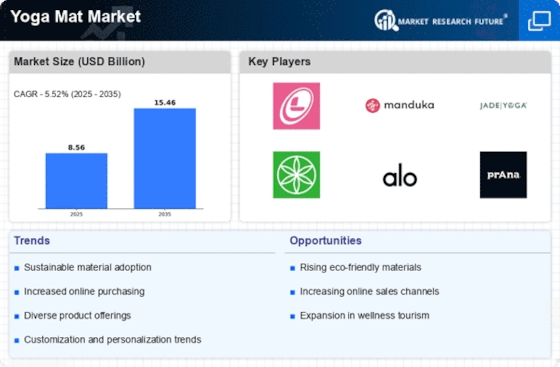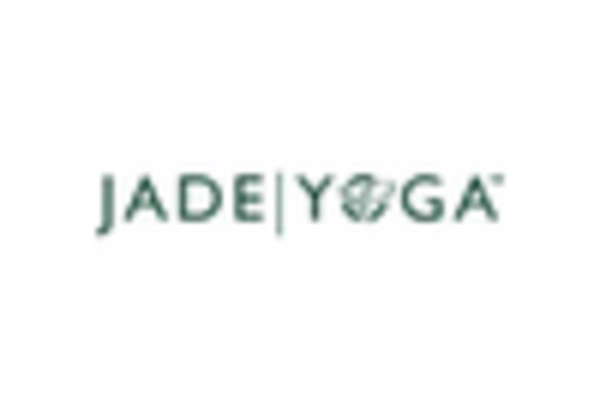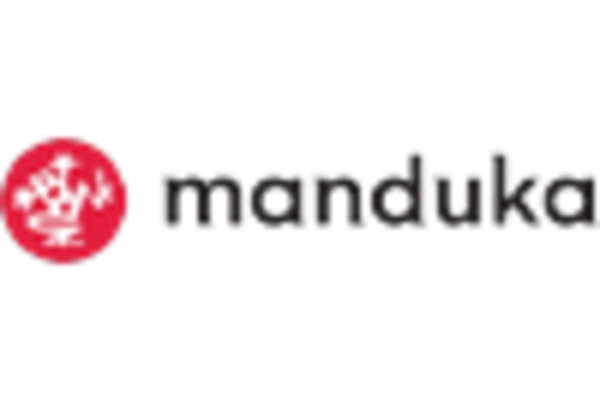Market Analysis
In-depth Analysis of Yoga Mat Market Industry Landscape
The yoga mat market is influenced by a multitude of factors that contribute to its growth and popularity among consumers globally. One of the primary drivers of this market is the increasing awareness and adoption of yoga as a holistic wellness practice. As more people recognize the physical, mental, and emotional benefits of yoga, the demand for yoga mats has surged. A yoga mat is an essential accessory for practitioners to perform yoga poses comfortably and safely, providing cushioning, support, and traction. With yoga studios, gyms, and fitness centers incorporating yoga classes into their offerings, the demand for yoga mats has expanded beyond dedicated yogis to include individuals from various fitness backgrounds.
Social and cultural trends also play a significant role in shaping the yoga mat market. Yoga has evolved from a niche practice to a mainstream fitness activity embraced by people of all ages, genders, and fitness levels. As yoga becomes more integrated into everyday life, consumers seek yoga mats that reflect their personal style, preferences, and values. Yoga mats are available in a wide range of colors, patterns, materials, and thicknesses to cater to diverse tastes and needs. Additionally, the rise of social media influencers, yoga celebrities, and wellness bloggers has popularized yoga as a lifestyle trend, further driving interest and demand for yoga mats.
Technological advancements and innovation in yoga mat design and materials contribute to the growth and competitiveness of the market. Manufacturers are continually developing new materials and construction techniques to enhance the performance, durability, and sustainability of yoga mats. Advanced materials such as eco-friendly natural rubber, TPE (thermoplastic elastomer), and PVC-free foam offer superior grip, cushioning, and durability while minimizing environmental impact. Moreover, features such as alignment guides, antimicrobial treatments, and reversible designs enhance the functionality and user experience of yoga mats, attracting consumers seeking high-quality products.
Distribution channels play a crucial role in the yoga mat market, with various avenues available for consumers to purchase mats. While traditional retail outlets such as sports stores, specialty yoga shops, and fitness centers remain popular destinations for purchasing yoga mats, online channels have become increasingly prominent. E-commerce platforms offer consumers a convenient way to browse a wide range of yoga mat brands, compare prices, read reviews, and make purchases from the comfort of their homes. Additionally, direct-to-consumer brands and subscription-based services provide curated selections of yoga mats, further driving market accessibility and convenience.
Price competitiveness is another important market factor in the yoga mat industry. Yoga mats are available at various price points to cater to different consumer budgets and preferences. While some consumers may be willing to invest in premium yoga mats made from sustainable materials and advanced features, others may opt for more affordable options that offer basic functionality. Promotional activities such as discounts, sales, and bundle offers also influence purchasing decisions and stimulate demand in the market. Moreover, as consumers increasingly prioritize value for money and seek products that offer durability and performance, manufacturers are focusing on offering high-quality yoga mats at competitive prices to maintain market share.
Consumer preferences and lifestyle trends also impact the yoga mat market. As people become more health-conscious and seek holistic wellness practices, yoga has emerged as a popular activity for stress relief, flexibility, and mindfulness. With the rise of home workouts and virtual fitness classes, consumers are investing in yoga mats for home practice and outdoor sessions. Moreover, as sustainability concerns rise, there is a growing demand for eco-friendly yoga mats made from natural, biodegradable, and recyclable materials. Additionally, as consumers prioritize convenience and portability in their active lifestyles, lightweight and travel-friendly yoga mats are gaining popularity, further driving market demand.
In conclusion, the yoga mat market is influenced by a combination of factors including the growing popularity of yoga, social and cultural trends, technological advancements, distribution channels, price competitiveness, and consumer preferences. As yoga continues to be embraced as a holistic wellness practice, the demand for high-quality yoga mats is expected to continue growing. Manufacturers and retailers that understand and respond to these market factors will be well-positioned to capitalize on opportunities for growth and innovation in the dynamic yoga mat market.


















Leave a Comment